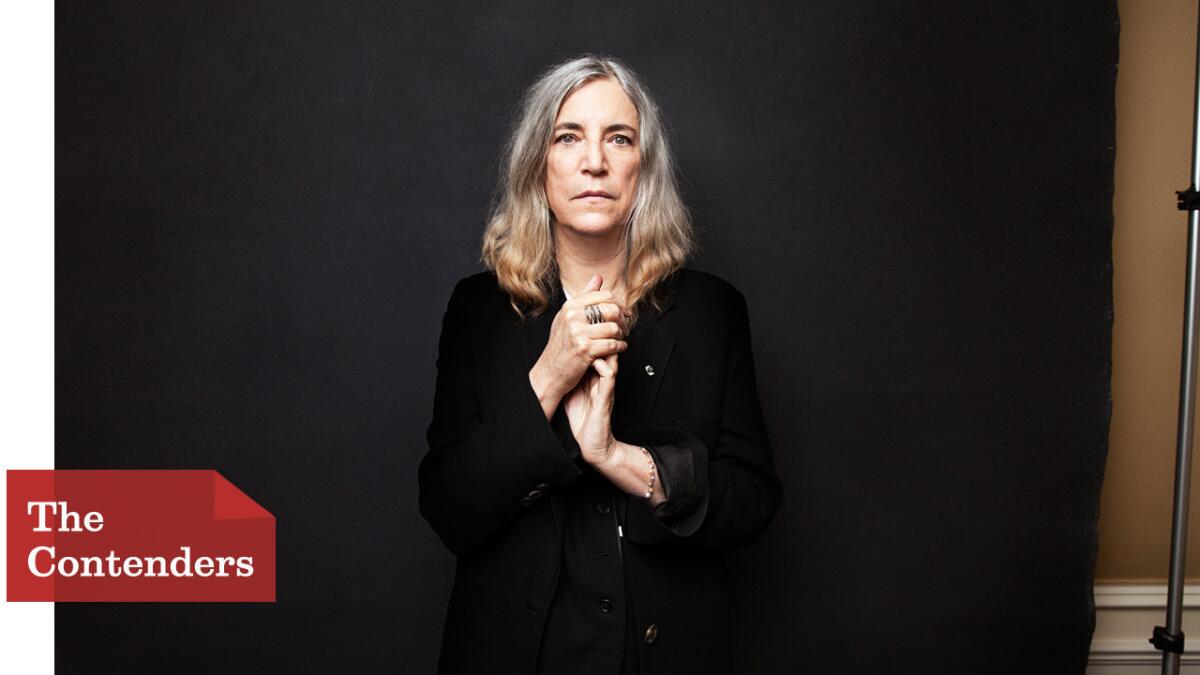The Envelope: Patti Smith wanted her ‘Noah’ song to be good for Russell Crowe

- Share via
The filmmaker and the Rock and Roll Hall of Famer (and National Book Award winner) were in town for the Venice Film Festival, having a stroll. The conversation between Darren Aronofsky and Patti Smith turned to the difficulties he was having coming up with a lullaby to be sung in two key scenes in his Old Testament epic “Noah.”
“She’s a musician, and she said, ‘I love lullabies and I’ve been writing them my whole life,’ and, of course, she has a deep connection with the Bible,” says Aronofsky. “She said, ‘I would love to do it; please, can I do it?’ — which is ridiculous, because she was asking me if she could do it and I was like, ‘OK!’”
“The stars are eyes watching you / A breath upon a cloud …”
Smith was raised a Jehovah’s Witness but has taken a decidedly individual spiritual path since then. The “Godmother of Punk” who famously added “Jesus died for somebody’s sins, but not mine” to her cover of Them’s “Gloria,” walked away from organized religion but has continued to study the Bible.
“I’m no stranger to the Scriptures,” says Smith in a separate phone call. “I’ve read the Bible quite a bit, there’s a lot of poetry in it — the Song of Solomon and the Psalms, a lot of poetry in Isaiah. So I tried to find language that wouldn’t be difficult to sing but wouldn’t feel out of place in this biblical setting.”
“So swiftly now beneath the bough / Your father waits for thee / To wrap you in his healing hands …”
Considering Smith’s long and storied career, it’s surprising that “Mercy Is” is the first song she has ever written for a film. She made priorities of serving the scene and fitting into the story’s world.
“We talked about what the song’s purpose was, the kind of atmosphere it was supposed to produce,” she says. “It’s very specific. It’s a song that had to be handed down from Methuselah to Noah’s father to Noah, and it had to be somewhat comforting because it’s a lullaby that Noah could sing to this little girl we believe to be dying in order to comfort her.”
Aronofsky says, “It’s used a second time when Emma [Watson, who plays Noah’s adoptive daughter] has to calm her children, when she thinks Noah’s going to sacrifice her children. So it had to be something very emotional and very calming.”
Smith says: “So I tried to think, what would the song be about? It seemed to me that, early in human history, the song would go back to the promise of Eden and communication with God. This is obviously way before the New Testament, so what would they be comforted by? The idea of the Father returning, or them returning to the Father, and redeeming Eden. So the song resonates that.”
“Two white wings / To carry you away / To a land in memory …”
“A lullaby is not just ‘Rock-a-Bye Baby,’” says Smith. “In singing a child a lullaby, you can give him or her wisdom. In the lullaby for Noah, the idea is that in life there is that hope that God and the promise of Paradise is with you always. Sometimes the simplest of songs can give us a great message, great hope. So a song that you sing to a child over and over, that message will eventually permeate their consciousness.”
Though one might expect having her first movie song performed by one of her favorite actors (Russell Crowe as Noah) would make the task more daunting, “it actually was inspiring. I’ve seen all of his films. I think that he has a way of drawing from a deeper well than many actors. It’s in his eyes. Ralph Fiennes has that quality. Certain actors, you can see behind their hubris or whatever they’re displaying, the possibility of tears. I knew who I was writing for. I was writing for Noah, but Noah as played by Russell Crowe. I wanted to make certain it would be good for Russell.”
“For mercy is the healing wind / That whispers as you sleep.”
“That last phrase,” says Aronofsky, “how she performed it, it was just chills — to everyone in the room, recording it. It’s a very difficult thing to do. There’s magic in those lyrics.”
More to Read
Only good movies
Get the Indie Focus newsletter, Mark Olsen's weekly guide to the world of cinema.
You may occasionally receive promotional content from the Los Angeles Times.










